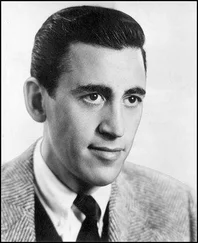Jerome Salinger - Nine Stories
Здесь есть возможность читать онлайн «Jerome Salinger - Nine Stories» весь текст электронной книги совершенно бесплатно (целиком полную версию без сокращений). В некоторых случаях можно слушать аудио, скачать через торрент в формате fb2 и присутствует краткое содержание. Год выпуска: 1953, Издательство: Little Brown, Жанр: Классическая проза, на английском языке. Описание произведения, (предисловие) а так же отзывы посетителей доступны на портале библиотеки ЛибКат.
- Название:Nine Stories
- Автор:
- Издательство:Little Brown
- Жанр:
- Год:1953
- ISBN:нет данных
- Рейтинг книги:4 / 5. Голосов: 2
-
Избранное:Добавить в избранное
- Отзывы:
-
Ваша оценка:
- 80
- 1
- 2
- 3
- 4
- 5
Nine Stories: краткое содержание, описание и аннотация
Предлагаем к чтению аннотацию, описание, краткое содержание или предисловие (зависит от того, что написал сам автор книги «Nine Stories»). Если вы не нашли необходимую информацию о книге — напишите в комментариях, мы постараемся отыскать её.
Nine Stories — читать онлайн бесплатно полную книгу (весь текст) целиком
Ниже представлен текст книги, разбитый по страницам. Система сохранения места последней прочитанной страницы, позволяет с удобством читать онлайн бесплатно книгу «Nine Stories», без необходимости каждый раз заново искать на чём Вы остановились. Поставьте закладку, и сможете в любой момент перейти на страницу, на которой закончили чтение.
Интервал:
Закладка:
“Who’s crying?” Eloise said.
“I know, but don’t. I mean it isn’t worth it or anything.
The front door opened.
“That’s Ramona back,” Eloise said nasally. “Do me a favor. Go out in the kitchen and tell whosis to give her her dinner early. Willya?”
“All right, if you promise not to cry, though.”
“I promise. Go on. I don’t feel like going out to that damn kitchen right this minute.”
Mary Jane stood up, losing and recovering her balance, and left the room.
She was back in less than two minutes, with Ramona running ahead of her. Ramona ran as flatfooted as possible, trying to get the maximum noise out of her open galoshes.
“She wouldn’t let me take her galoshes off,” Mary Jane said.
Eloise, still lying on her back on the floor, was using her handkerchief. She spoke into it, addressing Ramona. “Go out and tell Grace to take your galoshes off. You know you’re not supposed to come into the—”
“She’s in the lavatory,” Ramona said.
Eloise put away her handkerchief and hoisted herself to a sitting position. “Gimme your foot,” she said. “Sit down, first, please… . Not there—here. God!”
On her knees, looking under the table for her cigarettes, Mary Jane said, “Hey. Guess what happened to Jimmy.”
“No idea. Other foot. Other foot.”
“He got runned over,” said Mary Jane. “Isn’t that tragic?”
“I saw Skipper with a bone,” Ramona told Eloise.
“What happened to Jimmy?” Eloise said to her.
“He got runned over and killed. I saw Skipper with a bone, and he wouldn’t—”
“Gimme your forehead a second,” Eloise said. She reached out and felt Ramona’s forehead. “You feel a little feverish. Go tell Grace you’re to have your dinner upstairs. Then you’re to go straight to bed. I’ll be up later. Go on, now, please. Take these with you.”
Ramona slowly giant-stepped her way out of the room.
“Throw me one,” Eloise said to Mary Jane. “Let’s have another drink.”
Mary Jane carried a cigarette over to Eloise. “Isn’t that something? About Jimmy? What an imagination!”
“Mm. You go get the drinks, huh? And bring the bottle … I don’t wanna go out there. The whole damn place smells like orange juice.”
At five minutes past seven, the phone rang. Eloise got up from the window seat and felt in the dark for her shoes. She couldn’t find them. In her stocking feet, she walked steadily, almost languidly, toward the phone. The ringing didn’t disturb Mary Jane, who was asleep on the couch, face down.
“Hello,” Eloise said into the phone, without having turned the overhead light on. “Look, I can’t meet you. Mary Jane’s here. She’s got her car parked right in front of me and she can’t find the key. I can’t get out. We spent about twenty minutes looking for it in the wuddayacallit—the snow and stuff. Maybe you can get a lift with Dick and Mildred.” She listened. “Oh. Well, that’s tough, kid. Why don’t you boys form a platoon and march home? You can say that but-hopehoop-hoop business. You can be the big shot.” She listened again. “I’m not funny,” she said. “Really, I’m not. It’s just my face.” She hung up.
She walked, less steadily, back into the living room. At the window seat, she poured what was left in the bottle of Scotch into her glass. It made about a finger. She drank it off, shivered, and sat down.
When Grace turned on the light in the dining room, Eloise jumped. Without getting up, she called in to Grace, “You better not serve until eight, Grace. Mr. Wengler’ll be a little late.”
Grace appeared in the dining-room light but didn’t come forward. “The lady go?” she said.
“She’s resting.”
“Oh,” said Grace. “Miz Wengler, I wondered if it’d be all right if my husband passed the evenin’ here. I got plentya room in my room, and he don’t have to be back in New York till tomorrow mornin’, and it’s so bad out.”
“Your husband? Where is he?”
“Well, right now,” Grace said, “he’s in the kitchen.”
“Well, I’m afraid he can’t spend the night here, Grace.”
“Ma’am?”
“I say I’m afraid he can’t spend the night here. I’m not running a hotel.”
Grace stood for a moment, then said, “Yes, Ma’am,” and went out to the kitchen.
Eloise left the living room and climbed the stairs, which were lighted very faintly by the overglow from the dining room. One of Ramona’s galoshes was lying on the landing. Eloise picked it up and threw it, with as much force as possible, over the side of the banister; it struck the foyer floor with a violent thump.
She snapped on the light in Ramona’s room and held on to the switch, as if for support. She stood still for a moment looking at Ramona. Then she let go of the light switch and went quickly over to the bed. “Ramona. Wake up. Wake up.”
Ramona was sleeping far over on one side of the bed, her right buttock off the edge. Her glasses were on a little Donald Duck night table, folded neatly and laid stems down.
“Ramona!”
The child awoke with a sharp intake of breath. Her eyes opened wide, but she narrowed them almost at once. “Mommy?”
“I thought you told me Jimmy Jimmereeno was run over and killed.”
“What?”
“You heard me,” Eloise said. “Why are you sleeping way over here?”
“Because,” said Ramona.
“Because why? Ramona, I don’t feel like—”
“Because I don’t want to hurt Mickey.”
“Who?”
“Mickey,” said Ramona, rubbing her nose. “Mickey Mickeranno.”
Eloise raised her voice to a shriek. “You get in the center of that bed. Go on.”
Ramona, extremely frightened, just looked up at Eloise.
“All right.” Eloise grabbed Ramona’s ankles and half lifted and half pulled her over to the middle of the bed. Ramona neither struggled nor cried; she let herself be moved without actually submitting to it.
“Now go to sleep,” Eloise said, breathing heavily. “Close your eyes…. You heard me, close them.”
Ramona closed her eyes.
Eloise went over to the light switch and flicked it off. But she stood for a long time in the doorway. Then, suddenly, she rushed, in the dark, over to the night table, banging her knee against the foot of the bed, but too full of purpose to feel pain. She picked up Ramona’s glasses and, holding them in both hands, pressed them against her cheek. Tears rolled down her face, wetting the lenses. “Poor Uncle Wiggily,” she said over and over again. Finally, she put the glasses back on the night table, lenses down.
She stooped over, losing her balance, and began to tuck in the blankets of Ramona’s bed. Ramona was awake. She was crying and had been crying. Eloise kissed her wetly on the mouth and wiped the hair out of her eyes and then left the room.
She went downstairs, staggering now very badly, and wakened Mary Jane.
“Wuzzat? Who? Huh?” said Mary Jane, sitting bolt upright on the couch.
“Mary Jane. Listen. Please,” Eloise said, sobbing. “You remember our freshman year, and I had that brawn-and-yellow dress I bought in Boise, and Miriam Ball told me nobody wore those kind of dresses in New York, and I cried all night?” Eloise shook Mary Jane’s arm. “I was a nice girl,” she pleaded, “wasn’t I?”
Just Before the War with the Eskimos
FIVE STRAIGHT SATURDAY MORNINGS, Ginnie Mannox had played tennis at the East Side Courts with Selena Graff, a classmate at Miss Basehoar’s. Ginnie openly considered Selena the biggest drip at Miss Basehoar’s—a school ostensibly abounding with fair-sized drips—but at the same time she had never known anyone like Selena for bringing fresh cans of tennis balls. Selena’s father made them or something. (At dinner one night, for the edification of the entire Mannox family, Ginnie had conjured up a vision of dinner over at the Graffs’; it involved a perfect servant coming around to everyone’s left with, instead of a glass of tomato juice, a can of tennis balls.) But this business of dropping Selena off at her house after tennis and then getting stuck—every single time—for the whole cab fare was getting on Ginnie’s nerves. After all, taking the taxi home from the courts instead of the bus had been Selena’s idea. On the fifth Saturday, however, as the cab started north in York Avenue, Ginnie suddenly spoke up.
Читать дальшеИнтервал:
Закладка:
Похожие книги на «Nine Stories»
Представляем Вашему вниманию похожие книги на «Nine Stories» списком для выбора. Мы отобрали схожую по названию и смыслу литературу в надежде предоставить читателям больше вариантов отыскать новые, интересные, ещё непрочитанные произведения.
Обсуждение, отзывы о книге «Nine Stories» и просто собственные мнения читателей. Оставьте ваши комментарии, напишите, что Вы думаете о произведении, его смысле или главных героях. Укажите что конкретно понравилось, а что нет, и почему Вы так считаете.











